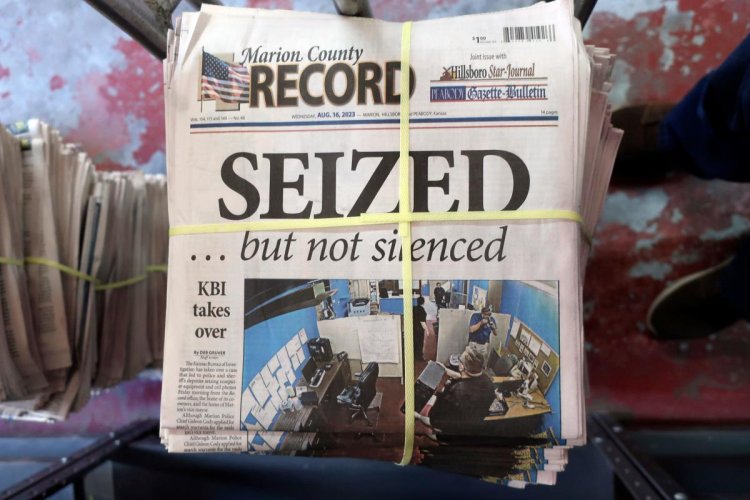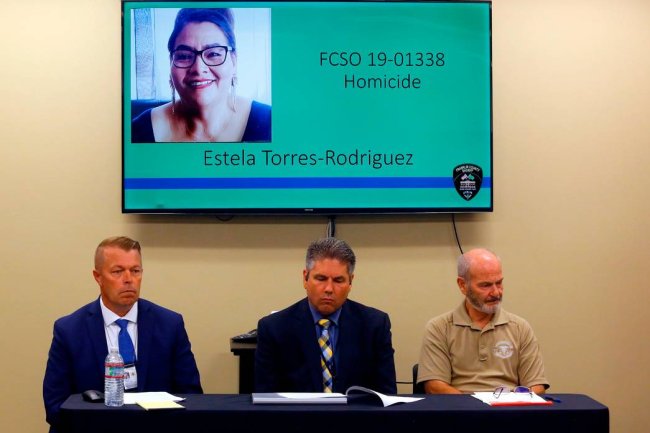First Amendment Foundation: Raids on journalists put free expression under siege | Opinion
Free expression is under siege across the county, from state and federal legislators, law enforcement officials, politicians and activists of all political stripes.In Florida book bans are back, in the name of protecting students from words and ideas. Rules limit who can demonstrate at the Capitol to those who share the “mission” of the state. Town councils threaten to banish reporters who ask inconvenient questions at public meetings. The Legislature recently tried (and failed) to rewrite defamation law to make it easier for the rich and powerful to sue critics into oblivion in the Sunshine State.Now, just when you thought it couldn’t get worse, it has.In Kansas police raided the offices of a weekly newspaper, the Marion County Record, confiscating computers and cellphones. They searched the home of the Record’s publisher, Eric Meyer, where his 98-year-old mother, Joann Meyer, a former Record publisher, also lived. The next day, Mrs. Meyer died, allegedly from the stress of the raid.W

Free expression is under siege across the county, from state and federal legislators, law enforcement officials, politicians and activists of all political stripes.
In Florida book bans are back, in the name of protecting students from words and ideas. Rules limit who can demonstrate at the Capitol to those who share the “mission” of the state. Town councils threaten to banish reporters who ask inconvenient questions at public meetings. The Legislature recently tried (and failed) to rewrite defamation law to make it easier for the rich and powerful to sue critics into oblivion in the Sunshine State.
Now, just when you thought it couldn’t get worse, it has.
In Kansas police raided the offices of a weekly newspaper, the Marion County Record, confiscating computers and cellphones. They searched the home of the Record’s publisher, Eric Meyer, where his 98-year-old mother, Joann Meyer, a former Record publisher, also lived. The next day, Mrs. Meyer died, allegedly from the stress of the raid.
What the Record supposedly did to break the law is a mystery, because the probable cause affidavit justifying the search was not released. There were allegations of hacking and identity theft but no details were given.
Legal experts called the raids a violation of both the First Amendment and the 1980 Privacy Protection Act, which, in general, prohibits police searches or seizures of journalists’ “work product” or “documentary materials.”
The Marion chief of police chief countered that the Privacy Protection Act didn’t apply because the journalists were suspected of having committed crimes and thus were exempt from the protections of the law.
By Wednesday, the top prosecutor in Marion County announced there were no grounds for the search and ordered the return of the confiscated electronics.
A happy ending? Not quite.


The Kansas raid was not the first time in decades that law enforcement ignored the provisions of the Privacy Protection Act to search a reporter’s premises and seize their computers. That dishonor belongs to federal agents who raided a freelance reporter’s office in Florida in May.
The FBI descended on the Tampa office of Timothy Burke and took computers, cellphones and hard drives. Just like in the Kansas case, the probable cause affidavit is secret.
Unlike in Kansas, there has been little media attention to the Tampa case, and the authorities show no signs of backing off. The repercussions of the FBI’s actions could have huge implications for press freedom and your right to know.
The warrant indicates the FBI is investigating violations of the Computer Fraud and Abuse Act, the federal criminal “hacking” statute, as well as unlawful interceptions of electronic communications under the “wiretap” statute.
According to Burke’s lawyers, the case arose last year when he downloaded a full live stream of an unedited interview of Kanye West, now known as Ye, by Tucker Carlson. The feed, available in a publicly accessible corner of the internet, contained antisemitic rants by Ye that Fox News didn’t include in its broadcast. Burke edited the feed and provided it to different news shows. Fox, according to Burke’s lawyers, “falsely claimed that the unedited live streams had been ‘hacked,’ and unlawfully ‘intercepted.”
More: Commentary: Opinions such as Kanye West's anti-Semitic comments must never be considered normal
The defense rejected those claims because the files were publicly accessible. Nonetheless, the court has rejected motions to unseal the probable cause affidavit on grounds that it could compromise the Feds’ investigation. Without the affidavit, the public cannot decide for itself whether the search warrant was justified or evaluate Burke’s allegedly illegal conduct.
More worrying for Americans are the FBI’s assertions that it can act outside the Privacy Protection Act because agents determined that Burke is not a journalist.
Moreover, the Feds confiscated not just the Fox feeds but all videos downloaded from public sites found on his computer, declaring them “contraband” because he did not have the authorization to have or use them.
This begs the question: Since when can the government decide who is and who is not a journalist? And under the FBI’s interpretation of the law, what rights do journalists have to publicly available electronic data? Is a document downloaded from the public part of a corporate website theft? What about a post from a public official’s Facebook page? Or information contained in a YouTube video?
One of Burke’s lawyers, Mark Rasch, an expert in cybercrime and privacy, says he sees a new and concerning direction in the Kansas and Tampa cases. “Searching and then seizing a journalist’s electronics for (suspected) hacking is a worrying new trend," Rasch said.
“When you execute a search warrant on a journalist or anybody collecting information to disseminate publicly, and you seize the contents of what they were going to broadcast or report on, that is the essence of prior restraint. It doesn’t matter if you try to do it with a court order, like they did in the case of the Pentagon Papers, or you do it by seizing it in person. It is prior restraint.”
We all should be worried.


Bobby Block is the Executive Director of the First Amendment Foundation.
This article originally appeared on Palm Beach Post: FBI, law enforcement raids on Florida, Kansas journalists are illegal
What's Your Reaction?













